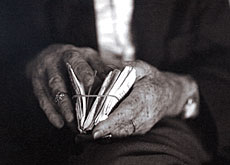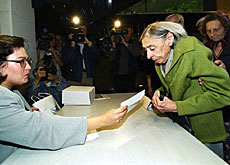Court considers who gets Holocaust funds

A New York court has begun to examine how the remains of a global Holocaust settlement fund should be distributed.
The deliberations are being chaired by Edward Korman, the judge who presided over litigation brought by Jewish groups and Holocaust survivors against Swiss banks.
As the hearing began on Thursday, Korman expressed regret that the Claims Resolution Tribunal had not worked as efficiently as he had hoped.
He said that “a massive destruction of documents” had taken place at Swiss banks which had made it harder to investigate the owners of accounts.
A $1.25 billion (SFr1.64 billion) global settlement between Jewish plaintiff groups and Swiss banks UBS and Credit Suisse was signed in August 1998.
But only $154 million of the $800 million set aside for Nazi-era account holders and their heirs has so far been paid out.
Korman, chief judge at the United States District Court in Brooklyn, last year invited proposals for what to do with the funds that still had to be distributed.
Over 100 individuals and organisations staked their claim for the money at Thursday’s hearing, including the Swiss Jewish Welfare Union which wants SFr53 million to go to needy Holocaust survivors in Switzerland.
Allocating funds
Korman favours an allocation formula put forward by Judah Gribetz, a Manhattan lawyer overseeing the distribution of the money, which would see 75 per cent of the fund set aside for Holocaust survivors in the former Soviet Union and 20 per cent for those living in Israel.
But last week the Israeli government lodged a formal complaint against the plan and called on Korman to defer his decision.
It said the allocation was disproportionate, given that around half of all Holocaust survivors lived in Israel, while only 15 per cent were from the former Soviet bloc.
Israel also wants 20 per cent of the money to be earmarked for Holocaust education and commemoration.
But Korman argues that the money should go to the poorest survivors in countries such as Moldova and Ukraine, many of whom receive an average pension of less than $18 a month.
Both Korman and Gribetz also argue that Jewish organisations in Israel and in the US have fared relatively well in terms of reparations and those in other countries should also benefit.
Fresh attack
Last week Korman launched a fresh attack on Swiss banks, accusing them of withholding information about thousands of dormant accounts.
“I don’t accept the underlying validity of Swiss [banking] secrecy laws,” Korman told the BBC.
Two months ago he called on the banks to publish a fresh list of 15,000 accounts belonging to Holocaust victims.
The Swiss Bankers Association (SBA) has consistently rejected claims that banking secrecy is to blame for the delay in distributing the remainder of the settlement.
The SBA argues that a committee under former Federal Reserve Board chairman Paul Volcker has already carried out an extensive audit of all dormant Holocaust-era accounts.
swissinfo, Vanessa Mock
UBS and Credit Suisse agreed on a global settlement with Jewish organisations and Holocaust victims in August 1998, in exchange for the dropping of all class-action litigation against them in the United States.
$800 million of the $1.25 billion settlement is earmarked for Nazi-era account holders and heirs.
$425 million has been distributed among Holocaust survivors, refugees turned away from Switzerland during the war, and to prisoners who carried out forced labour for firms linked to Switzerland.

In compliance with the JTI standards
More: SWI swissinfo.ch certified by the Journalism Trust Initiative










You can find an overview of ongoing debates with our journalists here . Please join us!
If you want to start a conversation about a topic raised in this article or want to report factual errors, email us at english@swissinfo.ch.